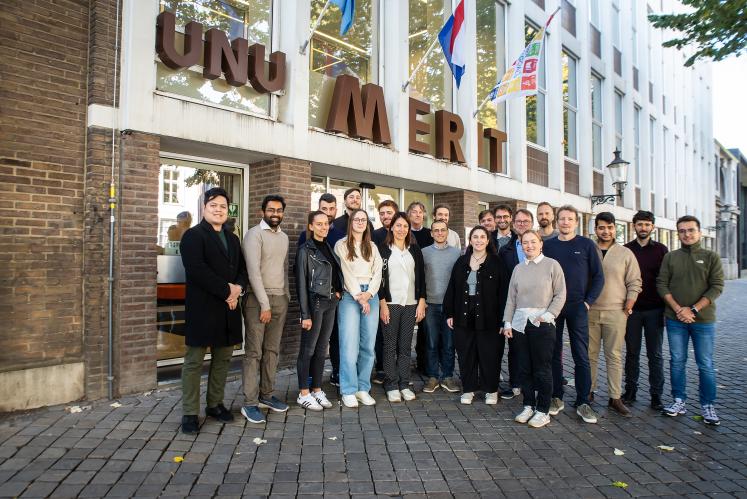The world’s most pressing challenges – such as climate change, economic inequality and digital transitions – are driven by the interactions of diverse, adaptive agents. To understand and address these challenges, we need tools that can effectively manage this complexity.
Recently, UNU-MERIT hosted its intensive course on Agent-Based Modelling (ABM) in the social sciences, bringing together a dynamic group of 18 selected PhD students from around Europe with several leading experts in ABM. The week-long programme was a focused training on the theory and practice of building ABM, empowering future researchers to tackle systemic challenges.
From theory to code and back: Building the modeller’s toolkit
The course was designed to equip participants from being users of existing models to being modellers. Most of the day was dedicated to hands-on coding sessions in R and the user-friendly Laboratory for Simulation and Development (LSD). These were complemented by expert lectures on specific topics, which provided an in-depth look at the details and experience of building complex ABM. Evenings were reserved for applying these new skills, collaborative group work, and – crucially – consultations where the course participants received feedback on their own research from the faculty.
The curriculum was designed to guide students through the entire modelling lifecycle: from conceptualising a research question and designing a robust model, to implementing it in code, performing rigorous validation and sensitivity analysis, and interpreting the results.
Connecting to UNU-MERIT’s research frontier
Besides the technical learning, the expert seminars and roundtable discussions provided a venue to explore how researchers at UNU-MERIT use ABM to contribute to world-leading research, including on the innovation-development nexus that was a protagonist in this year’s Nobel Prize in Economics.
Topics explored throughout the week reflected some of the institute's core research contributions: the challenges of modelling green and digital transitions; evolutionary selection and macroeconomic dynamics, linked to the institute’s seminal contributions in the economics of innovation and economic growth; and policy-led models on complex issues like pandemics, climate risks, and mission-oriented innovation.
By embedding these research themes within the PhD training, the course provided a unique bridge between advanced methods and their real-world application to theory- and policy-relevant questions.
Fostering a research community
A key success of the week was the vibrant community that formed. Faculty from UNU-MERIT and experts across Europe contributed to rich interdisciplinary discussions on participants’ diverse research questions – including macro and regional dynamics; urban, spatial, and segregation dynamics, energy transition, technology adoption and behaviour, innovation, knowledge, and complex systems; and industrial dynamics, GVCs, and structural change.
The final day saw participants present a model that they had built and analysed in groups, demonstrating a successful learning curve and a clear path toward applying these skills in their doctoral research.
An intensive and rewarding experience
Participants left not just with new technical skills, but with a new way of thinking about their research and a network of peers and mentors to support them in their research. The largely positive feedback highlighted the high quality and dedication of the teaching staff, who were praised for making complex concepts accessible and for providing constant support during the hands-on sessions.
According to most participants, the course was highly valuable in organising the modelling process. They noted that the course is very helpful in framing what type of thinking researchers have to do when designing and implementing their own ABM. The final modelling exercise was particularly appreciated, as it helped participants understand the core ideas, challenges, and features of agent-based modelling in practice. Many left feeling significantly more confident in their ability to apply these methods to their own research, refersring to thiw week as a "strong starting point" for navigating the complex field of ABM.
Building on the participants’ experience and constructive comments, we are already working to refine the programme for next year. UNU-MERIT is committed to advancing and disseminating cutting-edge methods to address global challenges. This intensive course reinforces that commitment, and we look forward to seeing the innovative research that will emerge from this talented group of scholars. We are already looking forward to the next edition of the course in 2026.
Suggested citation: Dr. Tommaso Ciarli, Raghav Sridhar Chakravarthy and Rafael de la Vega., "Analysing complex challenges: UNU-MERIT concludes a successful intensive course on Agent-Based Modelling. ," UNU-MERIT (blog), 2025-11-26, 2025, https://unu.edu/merit/blog-post/analysing-complex-challenges-unu-merit-concludes-successful-intensive-course-agent.



